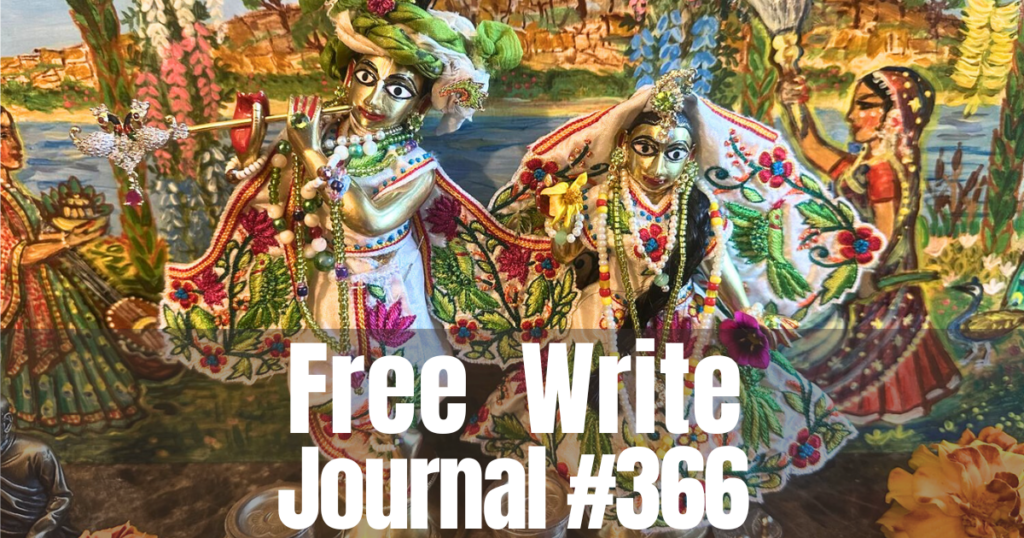
Dear Vaisnavas,
Thank you for your patience and tolerance. I am back in the loop for sharing the health report of Satsvarupa Maharaja with you. Here goes.
In general, he’s feeling better. The doctors have been trying to lighten up his medicine load, with some small but steady success. There is still regular but controllable headaches, and no migraine headaches for about six weeks. A chiropractor comes to the ashram twice a week to give him a few “cracks,” and this helps him stay more mobile even while living a sedentary lifestyle. He has spells of disorientation but is mostly clear, and more importantly, still writing well.
Hari Hari,
Baladeva
We need to expand our team of proofreaders as we aim to increase the rate of republication of Satsvarūpa Mahārāja’s books as well as new books that he writes.
This includes a need for fluent bilingual Spanish and English speakers to proofread Spanish translations (we currently have around 20 Spanish translations waiting to be proofread).
Anyone interested in this particular service should contact Manohara dāsa at [email protected]
If you would like to help, please contact Kṛṣṇa-bhajana dāsa at [email protected] or [email protected] and we will find you a service that utilizes your talents.
Early in the morning, my energies are for prayer. Prayer can be simple enough. You make obeisances without much delay before each dear and worshipable Deity in your mind. This is the right use of the mind. Then although you could linger in thoughts of Radha’s dasis in Vraja and the flowers and trees and Yamuna there, you have to chant your maha-mantras as your spiritual master ordered. You begin chanting, before anyone’s alarm clock goes off. Just chant and hear before the candlelight; eyes more often shut than open, seven minutes plus, but always under eight. Be modest about it: I will be glad if all day I can keep at this standard of non-drowsy, looking-at-the-mantra-poster-japa.
******
The fourth offense in chanting is to blaspheme the Vedic scriptures or scriptures in pursuance of the Vedic version. How am I guilty of this? I can say that I haven’t been studying my spiritual master’s books enough. I recently heard one devotee strongly advising others to read Prabhupada’s books for an hour a day. I don’t always do that, and that could be construed as a minimization of the scriptures. On the other hand, whenever I do sit down to read, I can appreciate Prabhupada’s instructions. Just this morning, I opened the Caitanya-caritamrta. The pages fell open randomly at a section I didn’t think was particularly nectarean, at Lord Caitanya’s dialogue with Sarvabhauma Bhattacarya.
In this one purport, Prabhupada quoted the Upanisads about the nature of the Absolute. He also quoted confidential passages from Brahma-samhita that this is the same Krsna who is the son of Nanda and the beloved of the gopis. It is amazing how Prabhupada presents his particular appreciation of Krsna as He who fulfills all of the qualifications of the Absolute Truth and whose confidential form is Govinda.
My point is that if I want to chant Hare Krsna purely and get the blessings of the holy name, I have to be appreciative of the Vedic scriptures and of my spiritual master’s presentation of them. Any kind of doubt in the scripture would come under this offense.
******
Recently in Rome, I gave an example of how Prabhupada, when he was asked, “Who told God His knowledge?” replied that God is independent. A guest in the audience said to me, “This is an intellectual or logical statement about God, but where is the actual proof of God’s existence?” I replied that the proof of God’s existence has to be learned from the science of God. She was alluding to the need for material science to support the Vedas, but I said the only science that gives us the full understanding of God is the science of God. We shouldn’t feel intimidated by other sciences and what they have to say about God, because knowledge of God is not within their jurisdiction. God does not come under the scientists’ microscopes and He doesn’t have to be proven by their theories and formulas. This is a faith that we have to live up to in order to avoid the fourth offense in chanting Hare Krsna.
******
What is my faith in the scriptures? I savor them in what time I have left after chanting. I am not making any kind of study to strengthen my intellect during this retreat (although there has to be time for that too). The point of these comprehensive nama-aparadhas is that you have to chant within a well-rounded life. You cannot only chant with the tongue while your mind goes somewhere else or your intellect is unfaithful (or your belly is over-stuffed or you have illicit sex or you are unkind to others). As I approach my japa, I am becoming more aware of the link between dozing off while chanting and nama-aparadha. Here lies the success or failure of my concentration and prayer.
******
Tired from walking, you speak always from your own point of view. What is Sri Krsna to me? He is the God of my religion. He is the Absolute Truth. He is the Deity form in the temples where I worship. He whose name I utter all day and night (when I can remember or when I have a bad dream), is in the heart of the mantra given to me by my spiritual master. Krsna is He to whom I am always loyal. He is behind the teachings I study. Krsna is Krsna; Radha is Radha.
******
I slid down from the peak of early morning attentiveness into a valley of slower rounds. Still, they weren’t as bad as yesterday’s. Good points: I took only fruit and yogurt for breakfast, that’s important. Then when my rounds were at their worst, I turned on the tape of Srila Prabhupada chanting japa and he and his devotees kept me going a bit more quickly. I am ambivalent about listening to the Prabhupada japa tape. There is a story that Prabhupada heard devotees listening to it and said it was more important that they hear their own japa. I also heard someone say that this tape is Srila Prabhupada chanting publicly at an initiation ceremony, “Now do like this . . . sit properly!” It doesn’t represent his normal, private japa. Nevertheless, it kept me going when I was sagging.
******
Some of the rounds were close to ten minutes long, but they were always headed in a determined direction, slow but sure, always bringing the mind back under the control of the self. My goal now is modest—just hear the mantra with faith that the harer nama sound will reveal Krsna as a person. Then His pastimes and qualities will also manifest. This is how I am spending my time. Poor as I am at it, I know that this is time well spent.
pp. 82-86
Having defied Kamsa’s law and order in many ways, Krsna and Balarama camped outside the city of Mathura. They would go into town in the morning and recommence Their roving pastimes. Think of Them at Their camp, perhaps well-guarded, and in any case, guarded by Their own self-sufficiency as the Kings of all creations. Think of Them maybe in tents, with flags and plenty of prasadam for the cowherd boys. Krsna and Balarama with Their sturdy lotus feet. You worship Them, you worship Them.
O Boys, Your devotees love You, and they want to see You happy. You seem to give them troubles, but they are hypnotized by You and cannot leave Your lotus feet. Actually, if we have trouble, it is not that You are giving troubles, it is not that You are giving them to us. Troubles are coming to us and You give us just a little token. What do I understand of these things? Better not to even bring them up? But sing of His pastimes while you can on this rare Sunday in winter Kerry, with sun shining and shining all afternoon as it comes down upon the hill and soon it will be out of sight. Until then …
The citizens looked upon the Brothers with amazement, taking Them to be demigods. How else could They perform such wonderful feats in an afternoon, breaking the state bow which was as big as a rainbow, and killing all the troops who had come to kill Them? How else could They put such fear into the once-mighty Kamsa’s heart so that he saw holes in his shadow, his footprints left no impressions in the mud, and everywhere he saw omens of his oncoming death?
Nothing sweeter . . . sitting on a
stiff chair just outside the house,
it’s like for a drinker to sip
his favorite wine. But still,
I cannot taste so deeply. I must
have done something to hinder my
spiritual advancement. Not exactly sure,
but then Prabhupada says it’s no
ordinary thing for God to talk to someone.
You have to worship Him with priti–purvakam
and then only He’ll talk with you.
Do you think it’s so cheap?
You can answer your own question,
“How come He doesn’t talk to me when I
chant His names?”
You should know the answer immediately.
Don’t be a rascal and say you don’t know.
Immediately declare, “I’m an offender,
not qualified.”
Go on sitting on the chair
as the sun, rare sun in Ireland
stays awhile and goes down.
It’s going to start at midnight. I’m going to read one paragraph of the KRSNA book (not this Mathura section but earlier chapters), and then I’ll mark some of it with yellow highlight. Then I’ll write what comes. It’s a way to make your writing more centered on Krsna and maybe a way to come closer to the consciousness of a devotee. Like Arca-vigraha dasi in the last weeks of her life. They say she loved hearing Krsna’s pastimes, even though her body was so much in pain. But she did want to fmish her project of six-foot by three-foot panels in the Prabhupada Samadhi. Art was not just a material attachment. She couldn’t do it, however, because it was too much strain. But she went to the work site and directed some other artists. That took surrender, not being able to do it herself. We are not the artists. She gave some directions and it got done before she died. She said sweetly, “I told you I’d finish it!” And now she’s gone. Gone to her spiritual evolution next life. One after another.
Come on, fellows, give us a little music. What the heck, I am not asking you to be a great concert group like some slick all-stars at Newport Jazz Festival in the 1960s. Just jam.
Dum du dum.
There was once a giant
elly fant named (get this)
Kuvalayapida, and his trainer egged him
on, “Go kill the boy named Krsna!”
The Lord really sported with him as
Prabhupada tells it. Slapped him hard,
dragged him back and forth by the trunk,
the way He used to drag or be dragged
by calves when He was a young boy.
He ran behind the elephant and
tripped it, disappeared under it
while the elephant stabbed the ground.
And finally finished him off
as well as the guy on top, the jerk
who thought he could kill the Lord.
Then He met the wrestlers. These big
guys with giant muscles like stone who
sweet-talked the boys in disgusting tones,
“Look here, little Krsna and Balaji. We know
You fellows like to wrestle in the woods,
so let’s
have a sport and please the king.”
Krsna was ready, but just for fun said,
“We’re only boys, it won’t be right.”
They fought head to head, wrist to
wrist, toe to toe, and finally when
the people were getting too upset because
they all loved Krsna and saw His perspiration
and the reddish hue on Balarama’s
face, the Lord said, “Bas,” and
threw Mustika around until he
died and then another and another came
running. One He kicked in the head
and cracked the skull. One Balarama
negligently killed with the left hand.
And the remaining thugs ran away.
The crowd in the stadium went wild,
cheering and beating drums, “All glories
to Sri Krsna!” They started recounting
the wonderful feats of Krsna, like lifting
Govardhana, but Kamsa said, “Stop! Stop!
Stop the music!” He was really teed off.
He said, “Throw these boys outta town
and plunder Their cowherd friends.
Kill Nanda and Vasudeva and my father.”
That was enough, Krsna had
heard enough. He jumped on
to the place where Kamsa sat and
dragged him
down to mortal ground where everyone
could see. And now that demon
who always thought of Krsna
day and night while eating and sleeping
and who wanted to kill Him,
met his own death
in a Krsna conscious way.
All glories to the Lord
of the universe
who punched the life out of
Kamsa the tyrant.
All glories to the KRSNA book.
pp. 18-21
I was invited to speak at ISKCON Chowpatty, where the scheduled Bhagavatam verse is in the seventeenth chapter of the First Canto. There, Prabhupada discusses the four principles of religion. Therefore, I took the opportunity to speak on truthfulness.
Prabhupada defines truthfulness in two basic ways. One is the practice of sacrifice or yajna. In every religion there is some form of sacrifice, and in Kali-yuga, the sacrifice is sankirtana. Therefore, truthfulness means to execute this yajna and not to neglect it. He also defines truthfulness as not being hypocritical. I dwelt on this definition in the Bhagavatam class I gave and hinted at how we could practice it. We can’t be personally truthful by always going along with what everyone else does. Truthfulness is individual and requires introspection and an alert conscience. It may involve confession, so that’s why it’s good to have a confidential relationship with at least one trusted devotee and with the spiritual master. We should be completely honest in those relationships.
Truthfulness, personal honesty, is an integral part of A Poor Man Reads the Bhagavatam. I constantly explore this theme, how after we give the “perfect parampara” lecture, we have to continue to be honest. Sometimes I seem to say that we are more honest when we are on our own, thinking and expressing ourselves without the restraint of being Vyasadeva’s perfect representative. I want to ask myself in a private hour, without censors, social fear, or institutional pressure, “How do I actually feel? What is my truth? Do I really love Srimad-Bhagavatam and Krsna? If not, why not? What do I want to do? Who am I?” Such naked exploration of personal truth cannot be always practiced when we are busy repeating what the parampara has said. At least not if we haven’t fully realized their words.
On the other hand, it could be argued that when we give lectures, we’re more truthful than afterwards. When we stick to the sastra, then certainly our words will be true. If we seek truth outside the bounds of sastra, we may find it elusive. We may even be misled because we simply can’t trust our own minds.
And so this discussion goes. I haven’t arrived at a cut-and-dried conclusion about it, but I know I definitely feel the need to pursue personal truth by an informal method. One reason for that is that a major part of my time is spent in my own mind, outside the formal presentation. When I’m giving a lecture, I seem to almost forget myself. I really do reach out to people and try to say what is best for them to hear according to Prabhupada’s teachings. It’s more my left-brain side because the utterances are conservative and I press them home with enthusiasm. In a public setting, I am the straight and conservative sannyasi. I’m not flaky. I speak what Prabhupada has said, and if that’s challenged, I defend it. But that’s not all of me. There is another side that’s right-brain and not so conservative. That other side wants to understand Krsna too, but for me to understand spiritual life as a whole person, I need to integrate the two natures that exist within this one body. That doesn’t mean that I do that separately from the life of an aspiring spiritualist, of one who loves to hear Bhagavatam, of one who wants to live according to its teachings. As a matter of fact, it means just the opposite.
For example, my truthfulness includes the candid expression that I could not go deeper into truth. I don’t always have the time to concentrate, I’m often interrupted, I write in short bursts between other activities. Is it better not to make such an admittance? Better not even to write at all if that’s the case, but to wait until such time that I can delve deeply with the power of sincerity and devotion? I can’t accept that as a solution because what if I never get that time? It’s better to express what I can now than to wait for a time that may or may not come. Krsna is the power in man, and He will be the one to decide whether or not I will be successful. I can’t live embarrassed by my poverty.
Rhetorical question: “What is the purpose of the bull in human society?” The bull plows the fields and pulls carts for transportation. Modern transportation despises the ox cart and instead prefers cars and trucks. At what price? We are forced to “flatter the Arabs.” One day, there may be no more fuel oil.
I felt alive when I said that, and I tried to make the lecture pungent by using Prabhupada’s exact language. It felt good to speak. Yet somehow or other, it’s not the kind of thing I say to myself when I’m alone. Rather than see one—the public versus the private—as better than the other, I want to present the difference. You can see it, can’t you? In the formal lecture, we are righteous representatives of parampara. When we’re alone, we may have more questions than answers.
One might say, “Alone I’m not as strong; I allow myself to become prey to doubt.” I don’t agree that that’s the whole picture. The lecture may be dynamic and bold, but it’s part showmanship and therefore has a dose of pretense, or at least a lack of deep reflection. I feel no need to pretend when I’m alone and not on stage. Each expression has a place, but the private expression is most important to me. It’s when I can most be myself.
pp. 98-102
When I fall in love it
will be forever he
sang no one played like
him
imitation. Now play
the people were talking too
loud and you couldn’t
pay attention
to the inner work where
you see yourself for who
you are and you decide
yes, this is who I want
to be, a lover, a rover, I
want to be a player on
a drum.
Doesn’t know if he wants
to be a Vaisnava with
topknot—can’t decide
on girl or boy because
that’s the kind of thing
decided by fate.
Deeper, the inner
person—are you sure
you like to live only
alone?
Do you want to catch
your irritability
your fears
and then decide I
don’t want to be
like that?
I want to be
changed
I want to be
the same
I don’t even want
to try to find out
they were asking themselves
these questions in the
waiting room.
I dove into the surf. I
stepped aside as a
truck roared by.
The Master in the
heart can help
but you’ve got to call out loud
and deep, “Please help me
and all these coaches will have some meaning.”
You tell me in my seat
of soul. No one else can
know for me.
You’re going to see me a tougher
guy. Get lost, mother.
If someone says why don’t you
phone me every day, or he laughs, “Ha!
You wrote a book about a mouse?”
I’ll say, “May mouse turds drop on you!”
My assertive new will
will be used in Krsna’s service. I say,
“Sorry, he can’t travel. Sorry, he’s not home.
He’s out in the garden.” Sorry, he’s sitting back in his
kickback chair. You
won’t find him on the
street or the plane
or the festival.
He writes books.
Oh! Look! Here’s
his God, beautiful
Krsna, the Lord of all.
So why bother about me?
Focus on Govinda.
He dared to tell you what
medicine is best, what Higher Power
and when to relax.
He says you are a worrier
and you need B2 shots.
He tells you enter the
Twelve Step program and do TM
biofeedback.
Why should we listen to
him? What right has he got
to tell me
the best formula for success
in life? Don’t tell your secret.
You dig me wrong. Take two.
Take three. It’s always
the Lord of Lords
in bowers
the supreme power
as a milker
of cows
just a child.
I want to be explicit
there was no way to get
home clear:
No free sandwiches.
You have to pay for it.
I am the one and only
person who has to decide
and live within my writing shed
no one understands
I don’t cry for you, I
don’t grieve. I’m just
detached. I feel good
as I plough the grass
there is no homeowner
in these suburbs as
happy as me.
I live in an atmosphere
of just fooling around. You
go to Sunday Mass and I give the
Looney Tunes sermon.
They understand the
story of Krsnadasa who
reconciled his guru as acarya
and flesh and blood
and who didn’t want
any woman on his back—
get them off!
This is the toughest call
but you can hack it if
you use your paring knife
and stand like a soldier
in the line.
He got it right in
Hackensack—all Catlicks
at Mass. But the masses
are in the streets
or at home with
TVs.
As for me, I’m free
chained to you.
pp. 196-99
Notebook #9 begins with thuds of spray against the rocks. The words and cadences of Vidagdha-madhava still in my mind.
Why have you come here with your notepad instead of a Bhagavad-gita or another book of study? Why do you write out your musings at length?
I have already told you, this is my service. By writing a lot, I may get better at it. And my service to the devotees may improve.
The sea is about as close as it will get under this cliff. It is calm tonight, otherwise the waves would be jumping up and maybe even splashing me. The waves crest on the rocks themselves, not before, and yet they are small waves.
Some kind of little gnat has appeared here. There goes a motorboat more quickly than the rest.
Krsna, I’ve done my quota.
Think of it again—the fact that you don’t write like a workman addressing the arguments of the karmis in a basic essay. Neither can you write an exalted philosophical treatise filled with the acaryas’ arguments. Neither do you do intense scholarship, and certainly you don’t know Vedic or Indian languages, so you can’t translate. You’re not qualified to write anything rasika from any experience. So you “doodle” your thoughts.
That’s not fair. I am doing something in American literature. I’m making a new chapter in American autobiography. Oh, why do I have to defend myself in those terms? I know what I’m doing. It’s for myself, a therapy and a bhajana. It’s for readers who know what I’m doing and who follow it avidly. It is a genre. And this is a process by which we can’t expect every page to be top-batch presentable.
Push and wash and smash—the waves hit the craggy breast of the rock again and again.
I glance from the corners of my eyes—partly blinded by my hood—thinking someone may be there. And I keep an eye that the waves don’t get too high. How dark is it, how cold is it, what am I writing? Am I destroying my coat by leaning against the rocks? Am I all right? Who are you asking? Better answer that yourself.
I could not worship Radha and Krsna, so my life is wasted. So laments Narottama dasa Thakura.
Friends, let us each pray to serve the holy names. And let us serve them together. Let us discuss spiritual life together and give each other encouragement. Tusyanti ca ramanti ca.
The sky. The horizon. The quick sketch. The little boat: back and forth they go. Remember your shop teacher, Mr. Shea? He signed everyone’s autograph book (when we graduated from P.S. #8 at twelve years old) by making the same quick drawing of a sailboat at sea and the same proverb about the sea and life.
Now these gnats will cause a problem.
Don’t linger anywhere.
I want to be kept down in humility. Just now reading a few pages of Begging where I discuss Manah-Siksa, I thought, “This is good writing. How can they criticize? Don’t they see how advanced I am?” But writing in itself doesn’t make for pride. Maybe a complacent looking at what you wrote later could promote vanity. But even if you do think, “This is good,” then use that to propel yourself forward. Because—as we see in the pages of this retreat journal—I often doubt the validity of my taking the time to write. But final products convince me that it’s worth it. Also, the special use of words that comes from practice, my own voice, etc., convince me that the more I write, the better I’ll be able to express myself in Krsna consciousness—and that means being more convincing, which is an important qualification of a preacher.
And the stumbling, the repetition, the passages when I am honest enough to write that no Krsna conscious interest or taste is present, they also serve as they lead me to better things.
I have to appreciate that not all I write is worthy, but that all the time is sincerely spent and that the process (of constant practice and free-writing) is freeing me to write better and better.
Photo of Prabhupada on this desk. I sprayed it with lens cleaner and shined it up along with the picture of Radha-Krsna. I have no theme, no topic. Later maybe I will again, in some diary dedicated to specific themes. That’s good for readers. Let’s stretch out for now and improve and see if this system works, where the editor selects for the collected writings, putting it into suitable containers. A reader does like to think he or she is going somewhere.
In If You Want To Write, Ueland quotes G.B. Shaw, discouragement is the only disease. Don’t let the bastards get you down (Auden said to a young writer, referring to critics). Down the critics, full speed ahead. Enthusiasm is all! (Said W. Blake.)
I walk around my garden seeing what the needs are. At different times, different things can be tested too. This retreat is for japa increase; I only do it three weeks a year. Another time I have to work at reading Srila Prabhupada’s books.
Hare Krsna, Hare Krsna.
Freer?
If you like. The motorcycle speeds through the fields. You are on the back. You are not sure of your driver. You go near cliffs. You go into the city. Always there is danger. You should not take a risky trip unless you have to.
Better to ride in a solid car at the specified speed limit, but keep going, moving as much as you can.
I heard Srila Prabhupada in a ’66 lecture. In the Eighth Chapter of Bhagavad-gita, verse 11. Srila Prabhupada read yad icchanto brahmacaryaṁ caranti and read aloud Dr. Radha-Krishnan’s translation which said, “Desiring such perfection, one practices self-control.” Srila Prabhupada said this translation is not correct. The word brahmacaryam means complete celibacy. He told how the young boys are taught celibacy. No sex life. That’s essential.
Don’t indulge in reading news, sports, and mundane literature. Some writers, like poets, I dip into to get a feel for what I want to do.
There is no need to keep dividing the lines in poetry, but keep on writing the poem.
What does that mean? What makes it a poem?
You know when you write them in a poem’s mindset. For now, it means when I go to that room and write on the big sheets of newsprint.
pp. 40-47
I have already passed the greatest moment of my life, met the most auspicious person I could possibly meet. One may say I have also expended my major effort in this lifetime to become his follower. The rest is … downhill? No, no. There are more years left and much ground to cover.
The yoga-brastha. He falls and fails, but whatever he did is good for him. In next life he picks up again where he left off.
Who are you preaching to? Orating? Do you want to unload your feelings for catharsis?
Oh, my life is auspicious I have come this far,
collection of photos of my past,
lost many of them along the way—
album of pics of me and Srila Prabhupada. I lost
the chance to be with him. He’s gone
back to Godhead out of
sight and I am trying to make the best of it, me and the
gang of transcendentalists. He inveigled us
to make war on maya and now
on his order we combat her—
as she offers last allurements.
“Srila Prabhupada!” sang Bir Krsna Swami,
“You’ve gone and left us all alone.”
Picture me thinking of the nice saintly person I met. Picture it dawning on me that I am egotistical (as I was in college). Picture the words coming to my brain and bewildering me. Reach out for help.
How did we get deviated? We used to strictly eschew everything but Krsna conscious models. Don’t be dogmatic and stereotyped, Prabhu. You’ve got to live where you are at. The preacher is not stereotyped. He uses what he can for research. But (don’t give examples from other people’s lives) I need to say for myself. Why expose these private things? People will misunderstand (damn people). I need to speak, howl.
I am not the center of the universe but am here trying to write pictures of the Krsna conscious world and that includes hearing shouts in this campground and having limited time. Me, me, me-centered. But I’m not the center, I know. I am the servant of my guru. Told my sister in 1967, one last phone call, that I am actually becoming religious. I said, “Many Catholics don’t follow the Pope, who is like the guru of the church. You need to follow a guru, and I have found one.” I tentatively wanted to tell her about him but not if she would attack him. And she wanted to attack. I said, “They are not following the Pope.”
“O Stevie,” she said. And later she told my mother, “Why doesn’t he follow the Pope?” I’d abandoned the guru. Yes, her logic was clever and caught me out apparently abandoning one religion for another. But my point was I did not make it in that religion, and like almost all Catholics I knew, I was not serious or convinced and satisfied or intent spiritual path. So if the Swami could lead me to that one spiritual path, why make argument, “Our guru is the Pope”? Yes, I agree that logic can be used against me and even against ISKCON or Prabhupada today. But I’m just telling you it happened. Don’t ask why. Go away (as Madeline did) if you don’t care.
That line is disconnected. It’s a past birth. I say I don’t know if there’s any value in your drawing it now. Please though, tell us what is meaningful for you.
Reading in library at Boston University. Reading Srimad-Bhagavatam manuscripts of the Swami and editing them. Typing, typewriter on floor, foot-pedaling the reverse button, the Swami’s voice coming to me in his Srimad-Bhagavatam recitation and spoken purport. “Our this Krsna consciousness movement . . . Kardama Muni said . . . ” I, typing. Two other devotees living with me in the storefront. Thugs outside. The night of dead-dread Boston student quarter suburbs near the trolley tracks in Allston, dumpy street-littered Allston where the Swami would come and stay with us in May 1968.
I saw a photo in The Jaladuta Diary. It showed him visiting the Boston pier in 1968, “with his disciples.” But he’s alone in the picture, at the rail, looking at the water and the tugboats and we were standing off while he in car-coat and swami hat . . . I’d like to have more photos of that time. There was one, got lost, showed Swamiji in the middle and me and the girl I was to marry on either side of him. I was wearing a tweedy sport jacket.
Those were times when we could go to see him.
Picture your deathbed your best head, picture you
receiving a new published book
from Gita-nagari Press. Picture this year
at the Ratha-yatra festival, your well-
wishers selling your books.
Whoa, hold on, too many pictures, too embarrrassing, too difficult to explain any of it! He slams the van door shut like a priest shutting the confessional screen. I’ve had enough. Then recompose yourself. Ah, what we all need is a more direct dose of Krsna consciousness.
pp. 58-61
You write here.
Last night at our meeting, I first played a tape by Srila Prabhupada in which he said bhagavata-bhakti-yogata. Life has been made very simple and easy by Lord Caitanya. Just chant Hare Krsna. Prabhupada then explained the verse of Siksastakam, ending by saying the unfortunate class of persons commit offenses and don’t have taste for the chanting. Then I told how I had felt positive during the day, but the chanting is it, not a mere approach to God or discussion about Him. It’s Krsna in the most direct form. We may not taste the bliss, but if we want direct access, this is it. Nothing else needs to be done but chanting.
I then read a quote from Namamrta that if one chants offenselessly, he becomes qualified to initiate disciples all over the world; he is jagad-guru. I don’t claim I am that, but it’s proof that a guru requires this. His disciples then become attracted to chanting and when he sees this he is in ecstasy. Another quote says a sannyasi need do nothing else but always chant Hare Krsna. I read the Second Canto verse on “steel-framed heart.”
Madhu said he thought that in this retreat he would progress step-by-step up to realization that Radha and Krsna are addressed in the mantra. But he has come “down to earth” and is at the first step of offenses. He read the purport where Srila Prabhupada recommends the names of Gaura and Nitai (Panca-tattva mantra) as more essential in this age than the Hare Krsna mantra. So we need to call on Their mercy before we chant Hare Krsna.
Manu said it was his steadiest day so far. He read some quotes. Bhakti-rasa read and spoke his appreciation for the simplicity of this practice. He said this week is teaching him for the first time that Krsna consciousness can be attained just by chanting, and that we actually can do it and don’t have to do anything else.
I said I discovered mechanical chanting as a stage beyond direct indulgence in inattention. “Mechanical” here means attentive to the mechanics, and it’s not a bad thing. But of course, it’s not yet done with the heart.
We are chanting with very few other duties. I hinted that I could give more retreats like this.
Today is the fifth day of seven. The sixty-four rounds are ahead of me as I write this. It’s a chore, but not a dreaded one. You just enter it and start swimming all day, two hours here, an hour there (on the walk), three hours in the living room with the fire in the fireplace, another three hours in the afternoon . . .
Hare Krsna Hare Krsna comes to mind when you wake. You sleep soundly.
Dreamt that Jesus worship was introduced in ISKCON and one devotee was representing it by wearing a picture of Christ on his T-shirt. He was like the figurehead or representative. That’s a real “dream” which will never happen in ISKCON as far as I can see. One reason in the dream for this worship was that when devotees already have faith (as some do in Jesus), then that is something rare and should be taken advantage of and used. That was their explanation why this would work although even in the dream people were doubtful and were aware that it was controversial.
In reality, it is a private thing, not a worked out theology or something to advocate—or worry about.
Sri-krsna-caitanya-prabhu nityananda. Chant the names of Gaurahari and Lord Nityananda.
In the first flash of lamp light, I looked and discovered a far developed case of athlete’s foot between my toes. Holes in the flesh. Got an ointment and will start treating it.
Last night I also read a statement that we should chant Hare Krsna mantra as practice for death. At death, Srila Prabhupada says even a person who has an accustom to chanting all his life may find it very difficult to chant. Therefore while we are healthy and able, we should use the time in the chanting. Then it’s more likely that we’ll be able to chant at the difficult hour. I said if I get notice of my death, I would probably do this, go somewhere and stop all else except chanting sixty-four (or more) rounds. Therefore, we are doing that now.
We give quotes and speak to encourage one another in the validity and rightness of this week vrata together.
While you can, chant. While the blood flows within the body and the bones are not cracked and you are not dead—chant.
Sure, there are many other services. I said it’s probably common in ISKCON to chant the sixteen rounds inattentively and get them out of the way. But this week we have gone beyond that. Since our vow is to do sixty-four each day, you can’t chant thinking, “I’ll get them out of the way as soon as possible and go on to more important activities of the day.” The chanting is the main activity.
And this is a written record of it.
pp. 298-300
I feel like a stranger walking on the back path of Gita Nagari. It is dark twilight and I can’t really see what trees may be beginning to grow new leaves. I can spot some white blooming that appears to be my old friend the viburnum blossoms. It may be that this year spring is starting more slowly. The road is lined with many ruts from the ox cart and the dirt is hard. I don’t know whether that means it’s frozen, or whether the dirt road is always like this and I just don’t remember it. I don’t feel very willing to enter an intimacy either. I almost feel like it would be going back to the period when I was sick. It would be going back to a consciousness of intimacy with nature I am reluctant to reenter. Perhaps I connect the two things too closely, invalid life and nature-communing, as something I don’t have to do now because I am going outward.
This walk should just be a pleasant break for me. I’ve had my full taste of solitude at Gita Nagari. Krsna gives you what you want, in reciprocation. I promised Him I would come out if I got health, and now I’m starting to fulfill that promise. Philadelphia was a wonderful return to action, dancing every morning back and forth in the temple room before Lord Jagannatha and Prabhupada with enlivened devotees, hearing the plans for expansion of the preaching there, and going out on harinama downtown. So I want to continue that wave; therefore, at Gita-nagari I should also enter the preaching spirit, the varnasrama, the village, the cow and ox development. My last year’s stay here was more removed and alone, and I hope to break out of that. I had my fill of it. Life is short, and according to our philosophy we’re meant to serve all living entities, especially human beings, by spreading Krsna consciousness. So I don’t want to enter too much a solitary spirit and neither am I inclined to detailed descriptions of the forest.
After he returned from his world travels with us, Bhakta Ralph decided to leave. He didn’t tell any of us. Damodara drove him into Lewistown “for a doctor’s appointment,” he got out of the car, and that was it—gone to us. He was with me in so many places, and as soon as he left my immediate company, he left Krsna consciousness. Maybe he saw something about me that disillusioned him. When I mentioned this to Paramananda, he laughed and said, “I don’t think that way.”
And now Dattatreya doesn’t want to travel with us from place to place typing up my diaries. “The last thing I want to do is edit more journal manuscripts.” I sympathize with him. I’ll help him to find a new, more satisfying service, and find myself another typist.
“Some things he writes he later changes,
and some things he just lets go.
In either case, I wonder,
Is this journal absolute?’
I know he’s trying,
but I need more than that.”
I cannot leave,
I have no choice
nor can I suddenly transform.
Back to spring at Gita Nagari. But I am different this year. Not confined, just visiting for a week. I will not spend day after day by the creek watching the chipmunk. It takes time, patience, and humility to make friends with the wildflowers. But I am moving through it too fast to notice the little things. Now my energies must go in other ways. What I prayed for all year, I now have: health enough to travel and work.
Surely Ralph will surface, alive,
back with his wife,
but I can’t be sorry
that he saw my smallness
or that he served me meals
and saw how much I ate,
or that I was silent,
and did not reveal great secrets.
All I asked him for
was the names of birds of Kerala;
I could have done more.
For Datta dasa
our travel is too hectic,
too much “Nature cure”
and not enough brain work.
All I asked him
was to edit
a caterpillar’s journal.
pp. 250-52
I mentioned to Srila Prabhupada that the devotees were planning to put his name on a sign over the door where he was staying, saying that on such-and-such a day, at 2:50 A.M., he began the Tenth Canto. Srila Prabhupada was pleasantly surprised, “You heard me?” We explained how we heard him beginning from the next room. Then he said, “Yes, the Tenth Canto chapters 29-34 are the smiling face of Krsna. Krsna’s flute can be heard in the Tenth Canto.”
He then told about Subhash Candra Bose. His was the real movement that gained Indian independence—not Gandhi’s nonviolent movement. Only the clerks and some teachers took part with Gandhi, and the British saw it going on for thirty years. They thought, “Let the old man go on with his philosophizing,” but when Subhash Candra Bose organized the Indian National Army and his Gurkhas and Sikhs were joining against the British, then the British knew it was all over. Gandhi differed with Subhash and removed him as president of India. Then Subhash Candra Bose went outside India. He tried to induce Tojo of Japan to help enter India. Tojo thought he would enter India, but then kill Bose. Then at one point, Subhash Candra was interned at home, but he disguised himself as a Muslim and escaped to Germany. He made a deal with Hitler and thus organized the INA. Indian soldiers would surrender to Hitler (this was World War II and the Indian soldiers were fighting as part of the British army) and be allowed to join the INA. Gandhi’s noncooperation movement was a good trick, but it did not succeed.
The granddaughter of this Nethaji (as he is called), Subhash Candra Bose, comes to visit Prabhupada infrequently. She made a remark that Srila Prabhupada is like Nethaji in that he has gone outside India to organize a movement of Vaisnavas. Srila Prabhupada liked that. He said, “Yes.”
He said that we have organized an army now and it is in the right hands:
You Americans are resourceful, you can do it. The frame is there, now organize. This mission is para-upakara. We don’t want to exploit anyone. Today’s so-called civilization keeps people in the clutches of maya. They are being misled, they are lusty, and they are demons. Our movement is against this. It is really para-upakara, to help the people, and you will be recognized by Krsna. Simply go on working for this movement. Take all strategic points for fighting. There is a declaration of war by us against maya. No, not actually maya, (she is a servant of Krsna). She would relinquish her grip on everyone, but because they remain demons she cannot. That’s her duty. Actually, we are fighting not with maya, but with the demons.
Now in this American opposition, the demons are feeling our presence. It is a fight and we have to defend. A fight is a fight. My Guru Maharaja used to say, “A fight is a fight, so some of our soldiers will die.” Still, then we should fight much more. Fight like brave soldiers. Krsna will help. Do not make a truce with the demons. The Hare Krsna mantra is our weapon. They are afraid of this astra weapon. Go on fighting. We are not like Vrndavana babajis who claim, “Oh, I am so advanced, I never go out of Vrndavana,” and at the same time keep three dozen widows.
The train ride from Bhubaneshwar to Calcutta took ten hours. Three of us—myself, Hari Sauri and Srila Prabhupada —were in the first-class cabin. The train left after 11:30 P.M. Srila Prabhupada took rest at 12 and got up around 3 A.M. Then after a while, he took a little more rest until 5:30 A.M. Then we all got up. As Srila Prabhupada got up, the first thing he said was that Ayurvedic medicine should be taken by us on our farms. That is also a basic part of maintenance, along with shelter and cloth. The train we were on was an express train, and as it was going past all the stops, Prabhupada asked me to call out the names of the towns. He was remembering them, because he is from the area.
A newspaper article arrived from the United States. I showed Prabhupada a January 23rd article from the Boston Globe entitled, “The Hare Krsna Puzzle.” I said it had pros and cons. He asked to hear the cons. I began one statement which described the devotees as parasites. We are not parasites, he said, we are giving the best literature in the world.
Does this literature come from illiterate hippies? We are accepted by scholars. Are we parasites? Then the high court judge is a parasite. They do not know what is a parasite. An intelligent person is not supposed to work like a dog or an ass. They work with their brains. Only a rascal sees the judge sitting, and because he is talking a little and getting a high salary, some¬one may say he is a parasite because he is not working like a common laborer. They do not know the value of using the brain.
I said, “They call us parasites. They are referring to the begging in the streets.” It is not begging, he said, it is humility.
If a father begs from his child, “My dear boy, please give me back that ten dollar note that you have foolishly taken and do not know how to use”—if I see this and say that the father is begging, that is childish. If I sell a book, is it begging?
I said, “Sometimes we don’t give books, but only flowers.” He said,
That is also humility. Mostly we give books, so don’t bring that in about the flowers. But that is also not restricted, that is humility. In India, highly scholarly persons beg. They are even given the title “Biksus Tridandi Swami,” which means begging. The sannyasis beg to learn pridelessness and humility. In Vedic culture it is allowed. The brahmacaris, sannyasis, and brahmanas are allowed to beg alms. “But what if the culture is entirely different?” I asked. Yes, your culture is different, he said. Therefore, there are hippies and murderers in the name of religion. Because there is no culture, you have killing—bombing—making the whole atmosphere abominable.
A brahmacari begs just to learn humility; even if he is from a big family, he does so in order to become meek. And Christ said, to the meek, God is available. You don’t know this culture. You have a culture to kill a child, so how will you understand this higher culture? He said we should learn to defend ourselves like this.
I mentioned to him that the opposition is claiming that it is not a matter of freedom of religion, but that we are guilty of mind control. He said that one whose mind is already in Krsna consciousness—they want to control his mind. They are guilty of mind control, not us. They take him, kidnap him, and force him. He asked if the article mentioned Krsna. I said, “Yes, many times.” “Then it is all right,” he said. I said, “The article is called, `The Hare Krsna Puzzle’; they say it is a great puzzle whether the Hare Krsna movement is good or bad.” At least, he said, they are now considering.
Formerly they said it was bad. Now we have come to the marginal point, whether Hare Krsna is good or bad. Finally they will come to the point, yes, it is good.
We should take these instructions to heart and mind. Sometimes someone may say to us about our dress or something, “Well, that may be all right in India. What you are doing is following some entirely different culture.” Then we can say yes, it certainly is a different culture. This culture is a culture of cats and dogs. This culture is a culture where you kill children in the womb. Yes, it is a very different culture, but we ate trying to give you a brain so that you can understand real culture. In this way, we do not have to fall into that relative bag of, “Oh well, that may be all right in India to beg, but this is America.” We can just say yes, this is America and therefore it is so degraded. We want you to learn what real culture is.
This is Prabhupada’s example. He never descends into someone else’s estimation of us and then tries to defend us on that level: “Please like us.” Rather, he says, “You are rascal,” and we stay on our Krsna conscious platform.
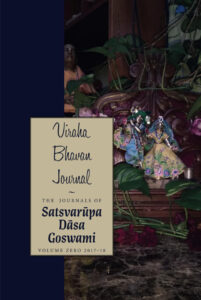
Viraha Bhavan Journal (2017–2018) was written by Satsvarūpa Mahārāja following a brief hiatus in writing activity, and was originally intended to be volume 1 in a series of published journals. However, following its completion and publication, Mahārāja again stopped writing books, subsequently focusing only on what became his current online journal, which began in August of 2018.
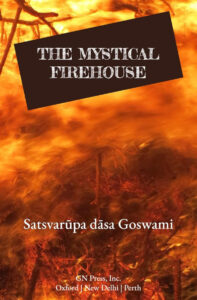
At first, I took it hard that I would have to live surrounded by the firemen, and without my own solitude. After all, for decades I had lived in my own house with my own books and my own friends. I was also now a crippled person who couldn’t walk, living among men who did active duties. But when Baladeva explained it to me, how it was not so bad living continually with other firemen and living in the firehouse with its limited facilities, I came to partially accept it and to accept the other men. I came to accept my new situation. I would live continually in the firehouse and mostly not go outside. I would not lead such a solitary life but associate with the other firemen.
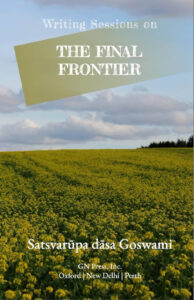
Let me write sweet prose.
Let me write not for my own benefit
but for the pleasure of Their Lordships.
Let me please Kṛṣṇa,
that’s my only wish.
May Kṛṣṇa be pleased with me,
that’s my only hope and desire.
May Kṛṣṇa give me His blessings:
Kṛṣṇa Kṛṣṇa Kṛṣṇa Kṛṣṇa Kṛṣṇa he
Rāma Rāghava Rāma Rāghava
Rāma Rāghava rakṣa mām.
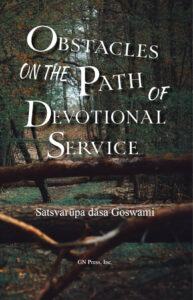
You mentioned that your pathway has become filled with stumbling blocks, but there are no stumbling blocks. I can kick out all those stumbling blocks immediately, provided you accept my guidance. With one stroke of my kick, I can kick out all stumbling blocks. —Letter by Śrīla Prabhupāda, December 9, 1972.
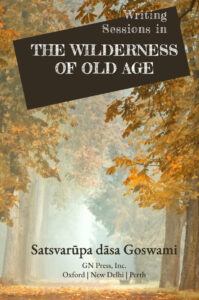
The Writing Sessions are my heart and soul. I’m trying my best to keep up with them. I am working with a few devotees, and they are far ahead of me. I wander in the wilderness of old age. I make my Writing Sessions as best I can. Every day I try to come up with a new subject. Today I am thinking of my parents. But I don’t think of them deeply. They are long gone from my life. Śrīla Prabhupāda wrote a poem when he was a sannyāsī, and he said now all my friends and relatives are gone. They are just a list of names now. I am like that too. I am a sannyāsī with a few friends. I love the books of Śrīla Prabhupāda. I try to keep up with them. I read as much as I can and then listen to his bhajanas.
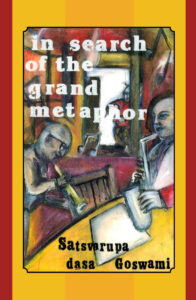
The metaphor is song. Explain it. Yes, particulars may not seem interesting or profound to readers who want structured books.
Wait a minute. Don’t pander to readers or concepts of Art. But Kṛṣṇa conscious criteria are important and must be followed. So, if your little splayed-out life-thoughts are all Kṛṣṇa conscious, then it’s no problem.
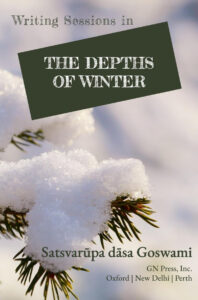
I am near the end of my days. But I do like the company of like-minded souls, especially those who are Kṛṣṇa conscious. Yes! I am prone to Kṛṣṇa consciousness. I have been a disciple of Bhaktivedanta Swami Prabhupāda for maybe almost sixty years. Sometimes I fail him. But I always bounce back and fall at his feet. It is a terrible thing that I sometimes do not have the highest love for him. It is a terrible thing. Actually, however, I never fall away from him. He always comes and catches me and brings me back to his loving arms.
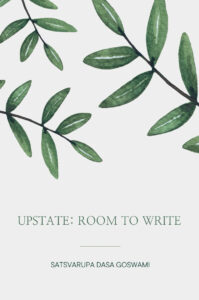
This edition of Satsvarūpa dāsa Goswami’s 1996 timed book, Upstate: Room to Write, is published as part of a legacy project to restore Satsvarūpa Mahārāja’s writings to ‘in print’ status and make them globally available for current and future readers.
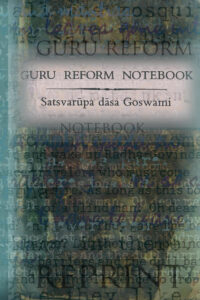
A factual record of the reform and change in ISKCON guru system of mid ’80s.
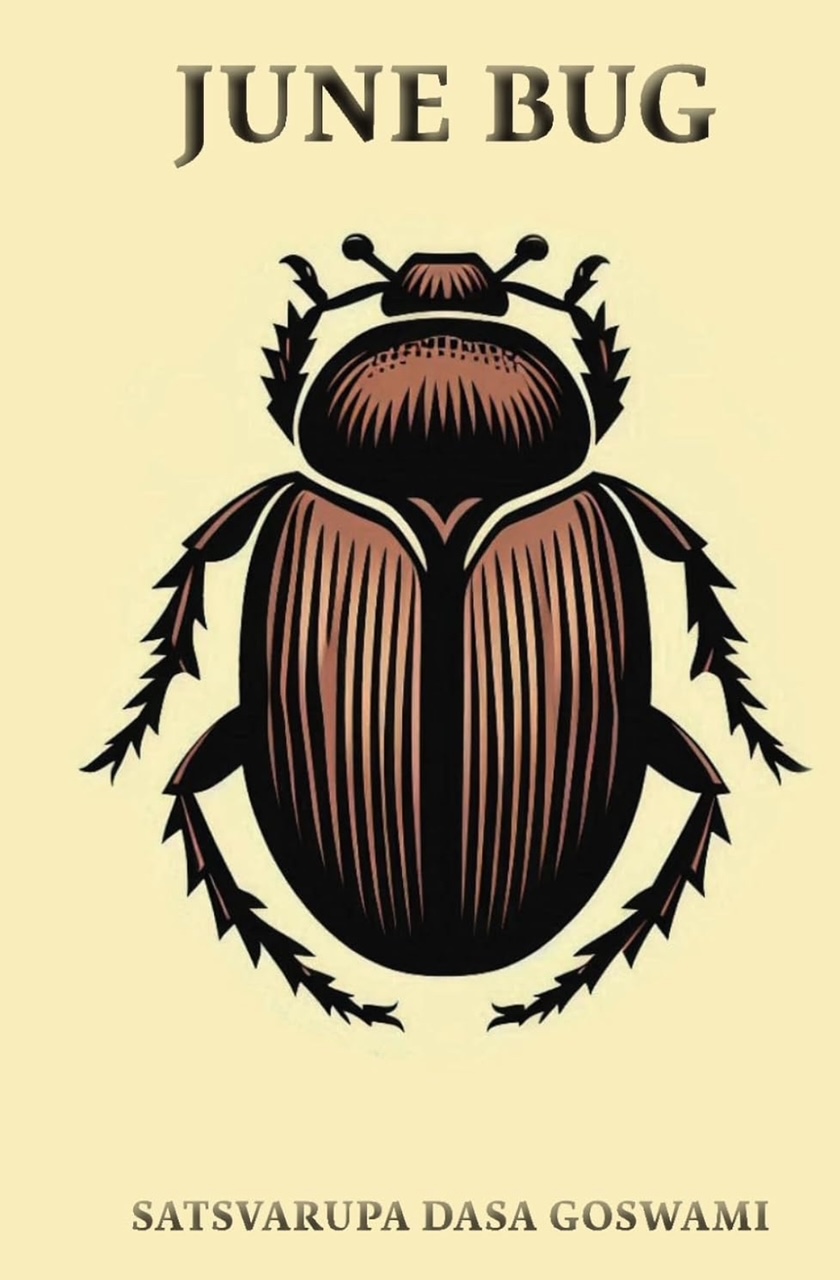
Readers will find, in the Appendix of this book, scans of a cover letter written by Satsvarūpa Mahārāja to the GN Press typist at the time, along with some of the original handwritten pages of June Bug. Together, these help to illustrate the process used by Mahārāja when writing his books during this period. These were timed books, in the sense that a distinct time period was allotted for the writing, during SDG’s travels as a visiting sannyāsī
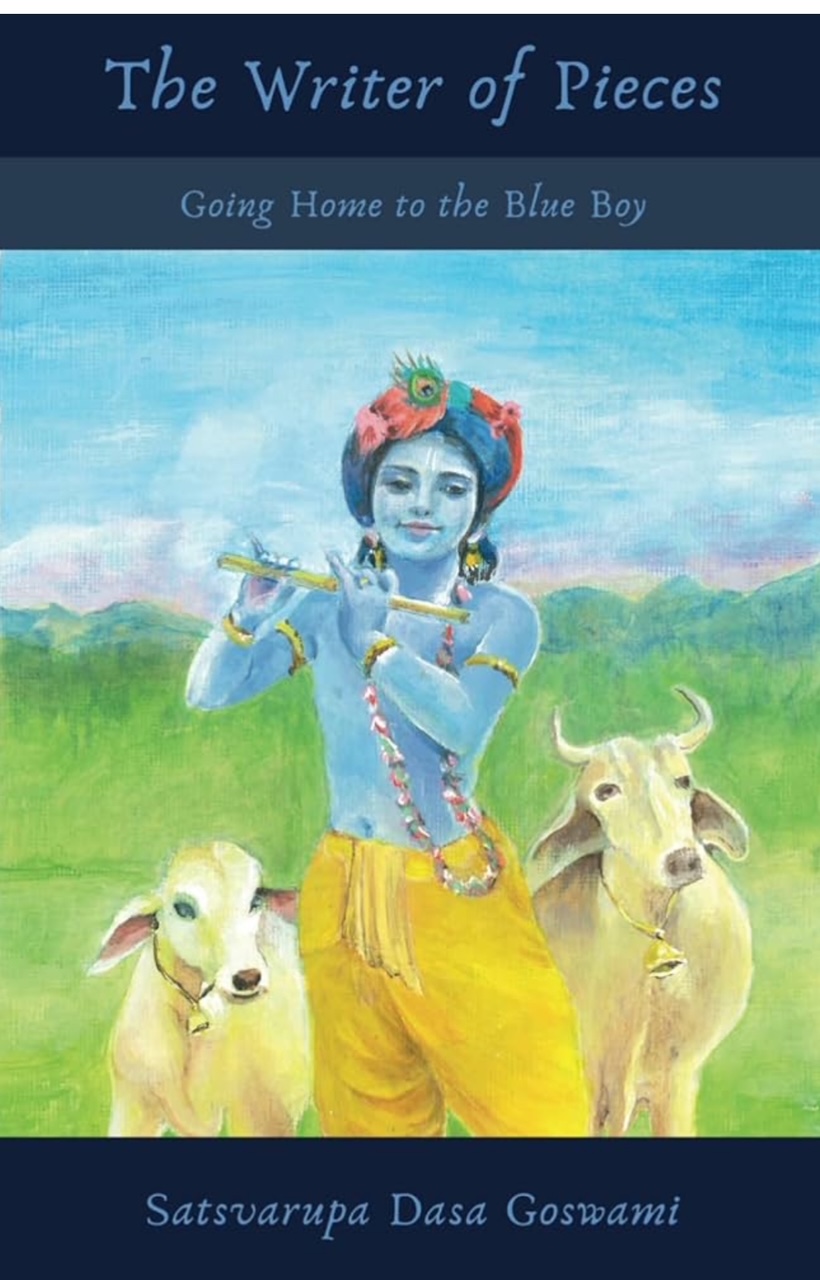
Don’t take my pieces away from me. I need them dearly. My pieces are my prayers to Kṛṣṇa. He wants me to have them, this is my way to love Him. Never take my pieces away.
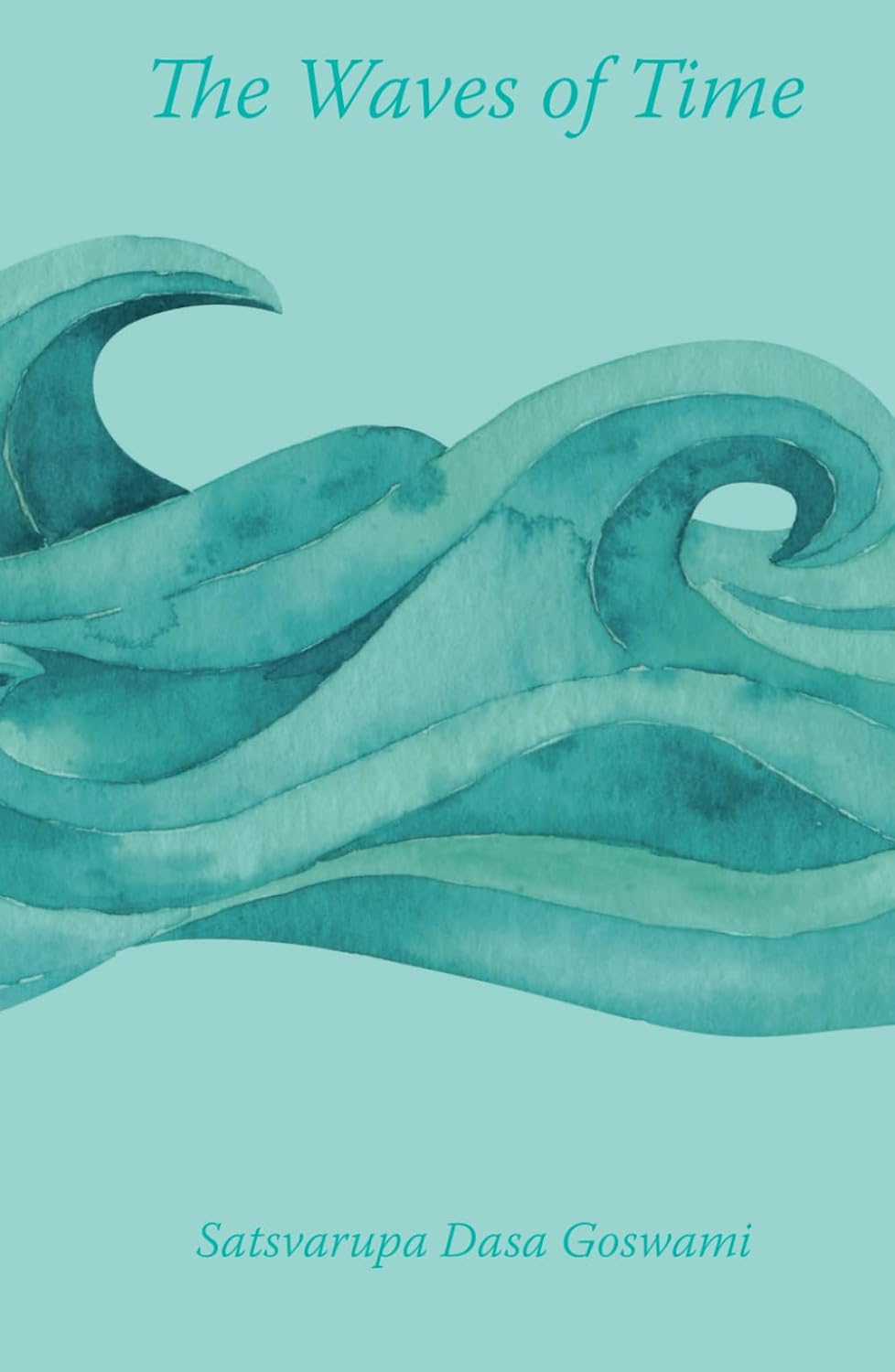
Many planks and sticks, unable to stay together, are carried away by the force of a river’s waves. Similarly, although we are intimately related with friends and family members, we are unable to stay together because of our varied past deeds and the waves of time.

To Śrīla Prabhupāda, who encouraged his devotees (including me) To write articles and books about Kṛṣṇa Consciousness.
I wrote him personally and asked if it was alright for his disciples to write books, Since he, our spiritual master, was already doing that. He wrote back and said that it was certainly alright For us to produce books.

I have a personal story to tell. It is a about a time (January–July 1974) I spent as a personal servant and secretary of my spiritual master, His Divine Grace A.C. Bhaktivedanta Swami Prabhupäda, founder-äcärya of the International Society for Krishna Consciousness. Although I have written extensively about Çréla Prabhupäda, I’ve hesitated to give this account, for fear it would expose me as a poor disciple. But now I’m going ahead, confident that the truth will purify both my readers and myself.

First published by The Gītā-nāgarī Press/GN Press in serialized form in the magazine Among Friends between 1996 and 2001, Best Use of a Bad Bargain is collected here for the first time in this new edition. This volume also contains essays written by Satsvarūpa dāsa Goswami for the occasional periodical, Hope This Meets You in Good Health, between 1994 and 2002, published by the ISKCON Health and Welfare Ministry.

This book has two purposes: to arouse our transcendental feelings of separation from a great personality, Śrīla Prabhupāda, and to encourage all sincere seekers of the Absolute Truth to go forward like an army under the banner of His Divine Grace A.C. Bhaktivedanta Swami Prabhupāda and the Kṛṣṇa consciousness movement.

A single volume collection of the Nimai novels.

Śrīla Prabhupāda was in the disciplic succession from the Brahmā-Mādhva-Gauḍīya sampradāya, the Vaiṣṇavas who advocate pure devotion to God and who understand Kṛṣṇa as the Supreme Personality of Godhead. He always described himself as simply a messenger who carried the paramparā teachings of his spiritual master and Lord Kṛṣṇa.

Dear Srila Prabhupada,
Please accept this or it’s worse than useless.
You have given me spiritual life
and so my time is yours.
You want me to be happy in Krishna consciousness
You want me to spread Krishna consciousness,

This collection of Satsvarūpa dāsa Goswami’s writings is comprised of essays that were originally published in Back to Godhead magazine between 1966 and 1978, and compiled in 1979 by Gita Nagari Press as the volume A Handbook for Kṛṣṇa Consciousness.

This second volume of Satsvarūpa dāsa Goswami’s Back to Godhead essays encompasses the last 11 years of his 20-year tenure as Editor-in-Chief of Back to Godhead magazine. The essays in this book consist mostly of SDG’s ‘Notes from the Editor’ column, which was typically featured towards the end of each issue starting in 1978 and running until Mahārāja retired from his duties as editor in 1989.

This collection of Satsvarupa dasa Goswami’s writings is comprised of essays that were originally published in Back to Godhead magazine between 1991 and 2002, picking up where Volume 2 leaves off. The volume is supplemented by essays about devotional service from issues of Satsvarupa dasa Goswami’s magazine, Among Friends, published in the 1990s.

“This is a different kind of book, written in my old age, observing Kṛṣṇa consciousness and assessing myself. I believe it fits under the category of ‘Literature in pursuance of the Vedic version.’ It is autobiography, from a Western-raised man, who has been transformed into a devotee of Kṛṣṇa by Śrīla Prabhupāda.”
 The Best I Could Do
The Best I Could DoI want to study this evolution of my art, my writing. I want to see what changed from the book In Search of the Grand Metaphor to the next book, The Last Days of the Year.
 a Hare Krishna Man
a Hare Krishna ManIt’s world enlightenment day
And devotees are giving out books
By milk of kindness, read one page
And your life can become perfect.
 Calling Out to Srila Prabhupada: Poems and Prayers
Calling Out to Srila Prabhupada: Poems and PrayersO Prabhupāda, whose purports are wonderfully clear, having been gathered from what was taught by the previous ācāryas and made all new; O Prabhupāda, who is always sober to expose the material illusion and blissful in knowledge of Kṛṣṇa, may we carefully read your Bhaktivedanta purports.

I use free-writing in my devotional service as part of my sādhana. It is a way for me to enter those realms of myself where only honesty matters; free-writing enables me to reach deeper levels of realization by my repeated attempt to “tell the truth quickly.” Free-writing takes me past polished prose. It takes me past literary effect. It takes me past the need to present something and allows me to just get down and say it. From the viewpoint of a writer, this dropping of all pretense is desirable.
 Geaglum Free Write
Geaglum Free WriteThis edition of Satsvarūpa dāsa Goswami’s 1996 timed book, Geaglum Free Write Diary, is published as part of a legacy project to restore Satsvarūpa Mahārāja’s writings to ‘in print’ status and make them globally available for current and future readers.